Ben Hewitt's Blog, page 27
May 15, 2016
I Watch it Every Day
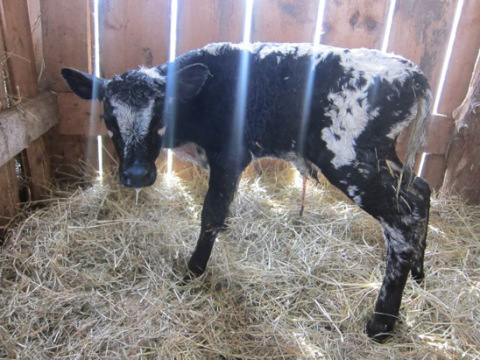
It rained steady in the night, and this morning the stream was full and fast. I listened to the churn of the water as I milked, and was soothed despite that restless, rushing motion. I’d been gone for 36 hours, and in that brief span of time the leaves on the poplars emerged, and now lie in a wash of green at the height of the land across the shallow valley to the north. It’s a relief, honestly, just that little bit of color.
During my time away (which is itself maybe another story for another day) I had conversations with other writers. The occasion of my trip had nothing to do with writing (or at least no more to do with writing than anything has to do with writing, which is to say that perhaps it had everything to do with writing), but those of us thus afflicted generally don’t have much trouble finding one another in a crowd. It’s almost like you can smell it on a person, that particular curse of curiosity and then – even worse – the anguish of how best to unpack it, like turning a many-sided stone over in the hand, trying to determine its most interesting aspect. There. Then turn again. No, there. And so on.
I won’t bore you with the details of my personal angst regarding this work, except to note that, with a handful of exceptions, it has of late been difficult for me to maintain my enthusiasm for the craft. Partly, I think it’s a condition of simple habit, the inevitable atrophying of an unworked muscle, until it is no longer able to carry weight that once seemed inconsequential, and so turning over that many-sided stone begins to feel like too great a task. I’ve never been a particularly disciplined or driven writer, always easily distracted by more pressing needs. And lately, pretty much everything feels more pressing.
Still, it was nice to talk with others about their work, about what matters to them and even what doesn’t, about how it fits into their life and even how it doesn’t. It can be pretty lonely stuff, this ceaseless stone turning, and a little company comes in handy.
Furthermore, it often seems to me that everything that really needs saying has already been said, and that what we really need more of are the stories that lie beyond the range of human language. The movement of the stream this morning. The weight of the air, still spitting out rain. The curl of the calf’s tongue around the bottle nipple, and the beaded foam of milk along its surface. Such a funny little detail. I watch it every day, so I don’t know why it still surprises me.

May 10, 2016
Promise Kept
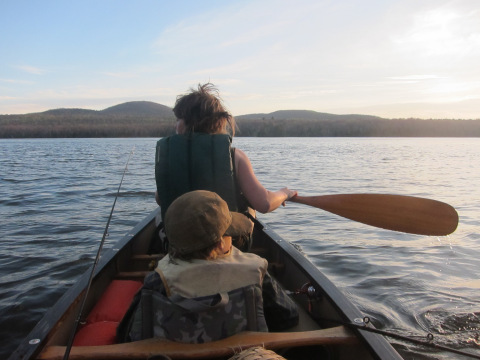 Yesterday was the first day I’ve written much of anything in weeks, and it was remarkably like emerging from a deep slumber. I felt groggy, clumsy, clunky; the individual words easy enough to come by but declining to find a natural order. And then, once wrestled into place, the realization that certain of them refused to comingle peacefully with their neighbors, and the sinking knowledge that a substitute must be found. Darn those substitute words; they’re never as right on their own as the original, and so one substitution leads to another which leads to another until you end up right back where you started, thinking that maybe your first choice wasn’t so bad after all. Screw the neighbors. They’ll just have to deal with the unruly bastard.
Yesterday was the first day I’ve written much of anything in weeks, and it was remarkably like emerging from a deep slumber. I felt groggy, clumsy, clunky; the individual words easy enough to come by but declining to find a natural order. And then, once wrestled into place, the realization that certain of them refused to comingle peacefully with their neighbors, and the sinking knowledge that a substitute must be found. Darn those substitute words; they’re never as right on their own as the original, and so one substitution leads to another which leads to another until you end up right back where you started, thinking that maybe your first choice wasn’t so bad after all. Screw the neighbors. They’ll just have to deal with the unruly bastard.
(I say “words” but of course what I mean equally is “sounds,” because good writing is both precise in definition and pleasing to the ear, although it is often necessary to sacrifice one for the other.
Still, though: It’s best to be careful with these compromises, or you risk ending up an academic. Or worse yet, a poet.
Heh.)
We are a week into milking, and I like how the clockwork nature of the task gives order to our days. This morning I milked just as the sun came over the trees and fell against Pip’s furred coat only inches from my face, and the smell that rose from that warmed spot reminded me in some vague way of rising bread and was comforting for it.
I milked Pip dry, fed the calf, then the chickens, finally the pigs. Returned to the house, stoked the fire, put on a pan for eggs, and poured a glass of milk from the bucket. I ate standing by the stove, too fast as usual, then walked back outside, promising myself to write something, anything, before day’s end.
So. Promise kept.

May 9, 2016
Some of it
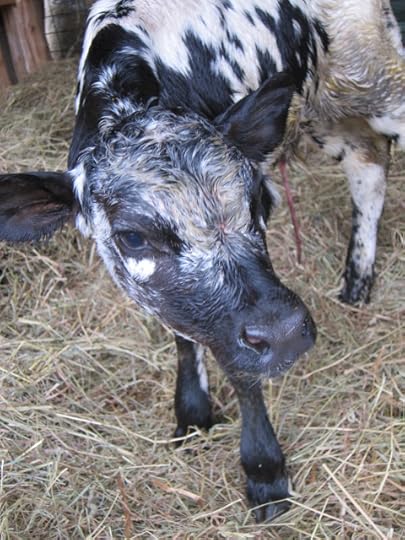
Back in milk
The land is slowly greening around us; the budding leaves set to unfurl at any moment, the grasses emerging from a winter’s worth of dormancy. Well, it wasn’t really a winter, more like five straight Novembers, each seemingly grayer and wetter than the last. A week ago I had occasion to drive due south for two hours or more, and it was as if I were driving into summer; near the end of my trip, I even passed two herds of grazing cows, though it was still too early for them to be on grass, and I figured the farmers were either low on feed, or perhaps merely unaware of how hard it will be for those pastures to recover.
Over the weekend we visited with old friends, good friends, people we haven’t seen enough of in the past years, as we’ve all gone about the commonplace business of our lives. They live with their nine-year-old son in a small house in a small clearing carved out of the woods, about a half-hour from here. It’s a place they built themselves, still unfinished in spots in the manner of so many owner-built homes. But no less charming for it.
These friends are our age. They do not have careers in the way most of us think of “careers.” He is a carpenter, charges a fair wage and works as little as possible or maybe just a bit more. Certainly not full time or even three-quarters time. She does some gardening for hire and light landscaping. Again, part time. They spend time with their boy, they work their own garden, they make a little syrup. He keeps the car (old) and truck (older) running best he can, which is pretty damn well; he’s a skilled mechanic, entirely self-taught. They just put up a small greenhouse and are excited by that. They have many friends. They have plenty to do, but do not seem particularly “busy” in the way most of us have become accustomed to, always the breathless pressure of too much to do and not enough time to do it, often feeling imposed upon by people and forces outside our immediate sphere of influence, and therefore shouldering a niggling resentment. I bet you know what I’m talking about, or at least some of it.
It is always comforting to me to spend time with people who have figured out how to make their lives work for them, and I’ve come to realize that my greatest respect is for those whose ambition (if even you want to call it that) is reserved for creating a peaceful life. It’s sounds so simple. Almost trite, really. But think about it for a moment: How many working-class people do you know who’ve been able to pull this off? True, it’s not so easy to do in this day and age, but I also believe it’s not has hard as we talk ourselves into believing. It’s almost as if we lack the cultural awareness of the possibility.
I think that when most people say they want to live a simpler (which is really more complex, but that’s maybe a topic for another day) life, what they’re really saying is that they want to live a more peaceful life. They want their breath back. They’re weary of carrying that small resentment.
When we left our friend’s place the other night, I felt refreshed, and even a little inspired. It’s not that they live so differently than us; indeed, we connect in large part because we embody similar beliefs and similar ideas about how we want to shape our lives. But it’s nice to be reminded of these things. Indeed, it’s important to be reminded of these things, and maybe even necessary. Because for everything we’re learning in this era of mass information and virtual connectivity, there’s a whole lot we’re forgetting. And some of it’s actually pretty damn important.

April 26, 2016
Doesn’t It Feel Nice
 We awoke to a brush of snow, and when I went outdoors, I found the cows lying nose-to-tail along a windrow of composting wood chips, taking the rising heat into their bones. The snow is not unwelcome – it’s been too dry for too long – though a steady rain would be even better. Last week I passed a fire truck extinguishing an out-of-control brush fire, and a few days after that, a friend’s sugarwoods caught, kindled by a spark from the stack. An acre-and-a-half burned, and he’s grateful it wasn’t more.
We awoke to a brush of snow, and when I went outdoors, I found the cows lying nose-to-tail along a windrow of composting wood chips, taking the rising heat into their bones. The snow is not unwelcome – it’s been too dry for too long – though a steady rain would be even better. Last week I passed a fire truck extinguishing an out-of-control brush fire, and a few days after that, a friend’s sugarwoods caught, kindled by a spark from the stack. An acre-and-a-half burned, and he’s grateful it wasn’t more.
It hasn’t rained since.
There is more to do than I know how to accommodate, or sometimes even consider. Strangely, last summer felt more relaxed than this summer is shaping up to be, probably because our task then was so clearly defined and understood, and everything else could go to hell. I mean, all we had to do was build a barn and a house. And move. Piece of cake, really. Plus, we had help, which cannot be underestimated, both for the increased capacity of labor and skills, but also (and perhaps equally) for the psychological boost.
We’ll be ok, of course. Things will get done, and that which doesn’t get done will get done later or ultimately be deemed unnecessary in the first place, and we’ll think to ourselves isn’t it lucky we didn’t do it back when we thought it had to get done, before we had a chance to realize it didn’t need doing at all?
It is noon now, the snow is still falling, the cows long since risen from their bed for feed and water. I bet when I go outside in a while they’ll be back on the chip pile, looking pleased with themselves in that distinctly bovine way, and I’ll amuse myself by imaging that their self-satisfaction is based on nothing more than realizing that all things they once deemed so important weren’t so important, after all.
And doesn’t it feel nice to rest those weary bones.

April 21, 2016
If Only You Can Figure Out What It Is
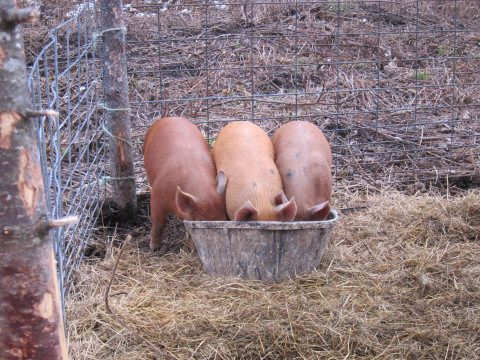
Hungry
Our older boy is sick, so for the past nights I took his place at the barn where our sons do chores twice weekly. There I rolled the big round bale down the aisle with my younger boy, both of us leaning into it with all we had and a little more, the cows lapping the last pellets of grain off the floor, the late afternoon sunlight slanting through the west windows, dulled by decades of dust, everything caught in the ethereal suspension of day’s transition to evening. The smell of cow shit and fermented grasses, the sound the cows shuffling and chewing, and the banter – always the banter: So-and-so did so-and-so to so-and-so, if it’d only rain the grass would green right up, the big Swiss isn’t producing like she should, and wasn’t that one hell of a sugaring season. On it goes, one tale after another, some of them tall, some of them true, and some split right down the middle. Not necessarily true, but not altogether untrue, either, and you know that even that part that’s not true speaks a certain truth. If only you can figure out what it is.
Yeah. I like those ones. I think those are my favorite.

April 19, 2016
Maybe Just a Drop or Two
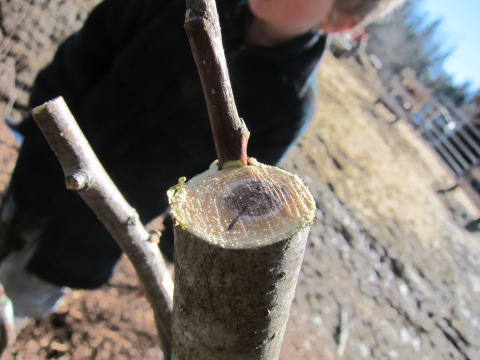
Sunday afternoon I walked up the hill to collect sap. I knew it would be the last gather; the evenings are too warm, now, and the trees are tired, anyway. I guess I’m a little tired, too; we’ve carried a lot of sap out of the woods, and spent a lot of days with the windows thrown wide to shed the heat of the wood stove as we boiled. The boys – whose job it is to keep the woodbox full – have soured on the task. Indeed, it has been a long sugaring season, almost ideal in every way – perfect weather, easy, snowless access to the woods, an extended cold snap to delay the onset of buds. I heard from someone who knows these sort of things that many sugar makers have run short on firewood. Records will be broken, I am sure of that.
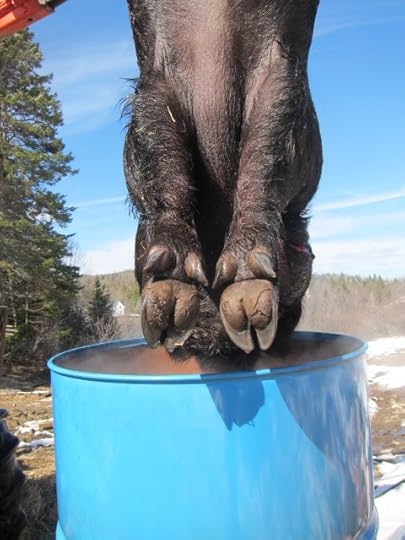
Death (life)
So. Sugaring done. One more tick of the seasonal clock behind us. Now: Finish firewood, water the seedlings, plant the new trees and prune the old ones, run fence, watch the cow grow fat with calf. Soon: Tend the garden, bale the hay, swat and curse the black flies, eat the salad, drink the milk. And if no one’s looking, maybe just a drop or two of syrup to sweeten the glass.
PS: Some of you might be interested in this commentary I wrote.

April 9, 2016
Stuff
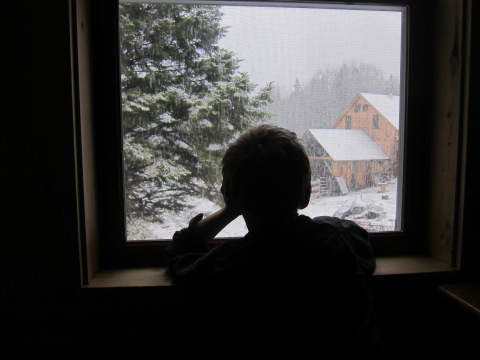
Morning of April 8, 2016
Deep in the night I was woken by coyotes, and I realized it had been a week or better since I’d last heard them. They seemed farther away than usual, and I lifted head from pillow to better gauge the distance. Three-quarters of a mile, I decided, though it could just have easily been more. Or less. The dog slept at my side, not even stirring at the ruckus, and I was reminded of how much she’s aged, which in turn reminded me of a story I’m working on, about a large animal vet around these parts, a man nearing retirement after decades of veterinary service. He’s an institution, really, and the very first call I accompanied him on was to a small hill farm a ways south of here, where he put down the family’s beloved and tumor-riddled hound before crossing the road to the barn, where he spun the testicles off a year-old bull with a power drill. Then we left, dog dead in the pasture, bull dazed and confused (rightfully so, I’d say), balls going cold on the compost pile.
Then the coyotes stopped calling, and I stopped remembering things, and soon I was asleep again.
Also:

It is through immersive, hands on, participatory experiences in nature that connections to the wild are made deepest. Crafts are made to be used and not merely admired; wild foods are not a novelty, but rather the basis for nutritive meals; the forest isn’t simply a place to visit, but a vibrant eco-system in which we thrive and grow.
In this camp we will spend the first four days working on crafts and learning skills to take with us out into the woods for the three-day, three-night immersion period. We will create burden baskets out of willow and rawhide to carry our gear, as well as tree bark dishes and a cattail visor to protect our eyes from the sun. Other projects can include bow drill kits, plant fiber cordage, and wooden spoons, all from natural materials found in the surrounding forest.
The Details
Preparation Days: August 6th – 9th we’ll meet from 9am-3pm at our Lazy Mill Living Arts base camp. During these days our focus will be on readying crafts and foods that we will use out in the forest. This year the projects will be rawhide burden baskets, bark dishes, spoons and cattail visors. Throughout the day we will also play awareness games, cool off in the nearby stream, and work on camp skills.
Overnights: August 10th-12th students will get dropped at 9 am on Tuesday the 10th and be picked up at 3pm on Friday the 12th. For the overnights we will take the woods skills we’ve learned and crafts we’ve made with us out into the Steam Mill Brook Wildlife Management Area, where we’ll camp under lightweight tarp shelters, fish and forage for our meals, play nature games, explore the wilderness, tell stories, and laugh.
Please know that we always do our best to accommodate financial need; don’t hesitate to contact us at 802-533-2085 or info@lazymilllivingarts.com with questions. And please don’t let a lack of camping/outdoor gear stop you from signing up. We can help!

April 7, 2016
Doing What Needs to be Done
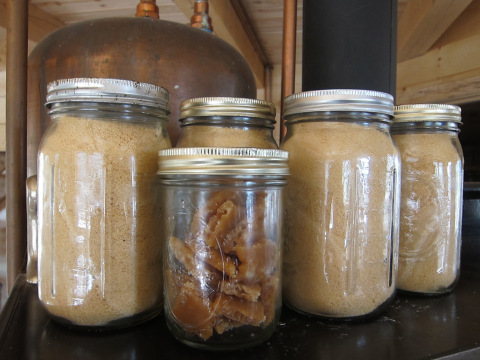
More sweets from the trees
Snow in the night. Not much, but enough to hide the mud, a brief respite from that small despair. But it’s melting already and the mud is returning in patches, first in the wells of my footprints to the barn and back at morning chores, then along the high edges of the furrows created by the weight of the tractor when I moved firewood yesterday. A nice old beech, a big tree, straight-grained and easy-splitting. I’m thinking it’s a half cord at least, which probably means it’s a third at best, and probably closer to a quarter.
Yesterday I walked past the remaining fatted hog on my way to drop that beech. He was supine and snoring in his nest of hay. I laid the saw at my booted feet and paused to scratch behind his ears a minute. He stirred, rotated his big head according to his pleasure, and as I scratched I realized how wrong I was when I wrote recently that I don’t mind killing animals for meat. Because I do mind. Quite a lot, actually. Truth be told, I’m dreading killing this fellow, which probably explains why he’s still alive, though of course I’ve been careful to couch my procrastination in the language of practicalities: Weather, conflicting obligations, other priorities, and so on. But the excuses are fast slipping away.
So, yes, I mind. But what I don’t mind is minding, and I suppose that’s where my confusion originated, although now I’m left to wonder if I’m a more compassionate person because I am bothered, or less compassionate because I am bothered, yet will not allow this discomfort to dissuade me? Riddle me this.
Either way, I know I will kill that pig, and soon. He is eating too much to not kill, and we’ve been out of bacon and pork sausage for months, now (fortunately, the supply of beaver sausage remains ample). Soon enough, I suspect, the acceptance of my discomfort will become a bigger thing than the discomfort itself, and I’ll stop thinking about whether or not I’m a compassionate enough person, and just do it. Or maybe we’ll arrive at the juncture where the pragmatics can no longer be made to justify further procrastination, and I’ll be reminded (yet again) of how many things in this life – my life, your life, anyone’s life, I suppose – really just boil down to doing what needs to be done.

April 6, 2016
Fire First

100% wood
Our neighbor Scott runs a small chainsaw repair and sales shop. It’s tucked into clearing on a gravel road, constructed of rough sawn lumber and a cracked concrete floor. There’s a wood stove with a glass viewing door that’s been broken for at least a couple of winters. Like as not, there’s something wrapped in tin foil set on the stove’s surface to warm for lunch. Once, when I stopped by the morning after a storm, I found a snowmobile parked at the entrance and a sign on the front door: We’re out on the snowmachines. If you need us, take the Skidoo and follow our tracks. You can sort of see what kind of place it is.
We have two chainsaws, and they get used a fair bit, so I stop by the shop pretty often. Plus, it’s only about a half-mile up the road from our place, and sometimes I get lonely, so there’s that. But generally I like to have at least a plausible excuse, so I go to buy bar and chain oil, chains, air filters, and so on. I even go to have the saws worked on. Chainsaws can be a little finicky; they run at ridiculously high rpm’s (your car generally runs at about 3,000 rpm’s, while a chainsaw runs at about 13,000), and are subject to a fair bit of abuse, so it’s not uncommon for things to break.
Scott has a single employee, a 20-something fellow named Levi, who, far as I can tell, has been working on chainsaws since he had to be careful not to spill bar oil on his diaper. I like Levi a whole lot. He’s a Grade A bullshitter, a story teller, a yarn spinner. As one might imagine, we get along real good. (PS: I like Scott a whole lot, too)
Most of the things Scott and Levi fix on our saws are pretty simple, and I’m always a little embarrassed that I didn’t at least try to fix it myself. But then I wouldn’t have had the plausible excuse to stop by and shoot the breeze while one of them tinkers on my saw for a half-hour or so and then charges me $10. I’m not sure how they decide what to charge – no one watches a clock or writes anything down – but it’s almost always $10. If I need a part, it comes of one of the 1,000’s of salvage saws piled in one of the adjoining rooms. Come to think of it, the part’s usually about $10, too.
Often another customer stops in while I’m there. Scott and Levi are quite popular among career woodsmen, so like as not, the man coming through the door (and it’s almost always men; I rarely see women in there) makes his living in the woods. These are folks who buy bar oil by the case. They drive large-ish pickup trucks that are dented, because logger trucks are always dented, as if the standing trees are exacting some small revenge for their fallen brethren. They have heavy northern Vermont accents, and speak the vernacular common to the region. For instance, Don’t for doesn’t (as in, it don’t matter to me). Good for well. And ain’t. They tend to say ain’t pretty often. Shit and fuck get tossed around a fair bit, too. They have thick arms and thicker chests, or they’re wiry in that muscle-over-bone way, and if they’ve been cutting softwood, they carry the sweet smell of spruce and fir. They are usually cheerful but occasionally are not.
Wood is huge factor in our lives. We put up all our firewood, and we mill much of the lumber we use for our building projects. Just today I spent a couple hours bucking and splitting firewood, then a couple more hours running rough pine boards through a borrowed planer to make wall paneling. We warm our house with wood, we cook on wood, we make maple syrup and sugar on wood, our water is heated by wood, we build with wood Truth is, I bet we spend more time with our hands on dead trees then we do with our hands in the soil. Our lives are at least as dependent on the forest as they are on the garden, and I guess this makes sense, because for at least six months of the year ‘round these parts, you’ll freeze to death before you’ll starve.
What I’m saying is: Fire first. Then food. Remember that, and you’ll do just fine.
Also: I wrote a bit more about Scott’s shop here.

March 31, 2016
The Way I Hear the World

Maple sugar
Yesterday morning we awoke to a swirling snow, and upon awakening I recalled that in the night I’d heard the gusting wind and in the haze of half-sleep thought to myself how much sounded like a chant. Rising, falling, leaving off and rising again, the pitch changing according to the force of the air behind it.
After chores, I walked into the woods to collect what sap had flowed in the hours between yesterday’s gather and the cessation of the run. The northwesterly faces of the trees bore long stripes of caked snow, driven by the wind. The ground was soft, the snow sticky enough to not be slippery. There wasn’t much sap. Five, maybe six gallons. I hauled it home. It’s on the stove right now.
I am working on a project with Heather, about our respective experiences with home schooling. It is audio-intensive and interactive, which means it will also be about the experiences of anyone who participates. I am really enjoying the process, in part because I’m sort of fascinated by the audio component (and huge thanks to Erica for so generously sharing her Great Wisdom), and in part because I’m sort of fascinated by the conversations Heather and I are having. She is one of those people who says tremendously insightful things without even realizing she’s done so. This is a quality I deeply admire, and though I know it’s a stretch, I’m hopeful some of it will rub off on me.
So far, Heather and I have talked a lot about our respective – and remarkably divergent – paths, about socialization and community, about the challenges we’ve faced, about deschooling ourselves, and about honoring averageness in both children and adults. We’ve also tried to answer the questions Heather solicited, while acknowledging that every question has many answers, and that neither one of us has this all figured out. We’re as imperfect as anyone. In my case, at least, perhaps even more so.
It’s fun for me to be doing something new, and I’m super-excited about the possibilities. If this project is successful (admittedly, I have no idea what success looks like in this context, but I trust we’ll figure it out along the way), Heather and I have talked about tackling other subjects via this medium. I think the audio component lends a lot of warmth and spontaneity to the collaboration; our conversations thus far have not failed to take us in surprising directions. It also offers a way for folks to participate away from the screen, although to be clear, there will be an online component as well.
While I hope Heather and I will be able collaborate on more of these projects, I’m also looking forward to exploring ways I can include audio in my other work. I’m not sure yet what this will look (sound) like, but I’m enjoying how just thinking about it is impacting the way I hear the world. I think that many writers – including myself – have a tendency to focus on the visual, even as we lose sight (pun intended) of smell, touch, sound, taste, and so on. For anyone interested in improving their writing, I think it’s a great exercise to include at least one description from every one of these senses in their next piece.
It’s been a pretty good sugaring season. The bigger producers I’ve talked to are at about 3/4 of a typical crop, and there should still be a couple weeks to go. I’m glad we hung some buckets; we skipped last year in deference to our preparations for moving, then felt the absence. You do something long enough, and it sort of imprints itself on you, and you don’t even realize it’s happened until you stop.

Ben Hewitt's Blog
- Ben Hewitt's profile
- 37 followers



